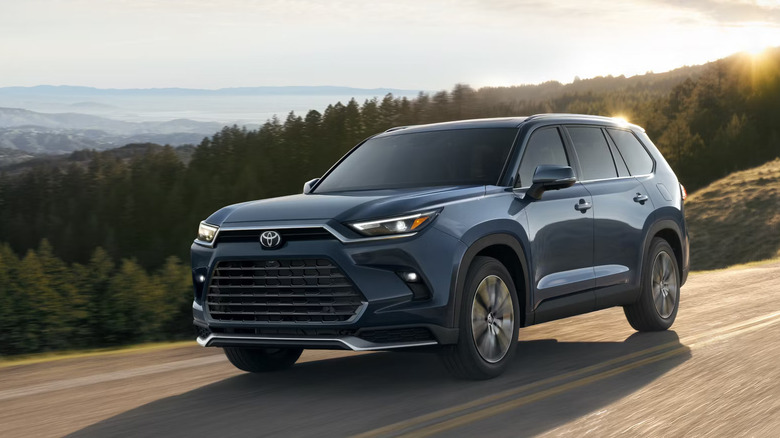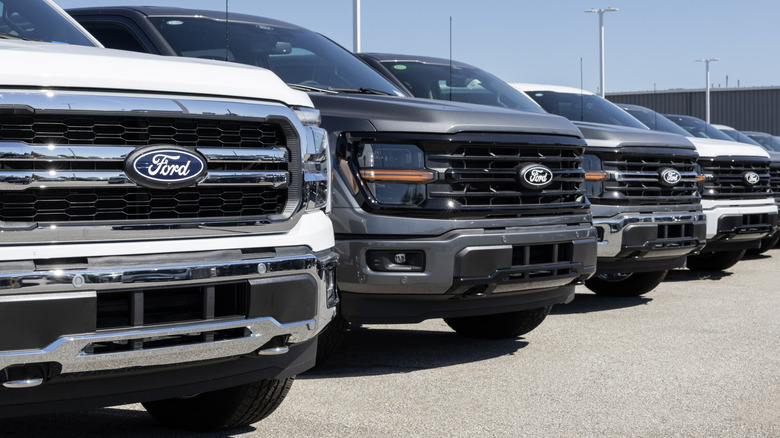Do SUVs Get Better Gas Mileage Than Trucks?
Nobody likes wasting money, and so it's of paramount importance to do as much research as possible into the running costs of cars before heading out and treating yourself to a new vehicle. Comparing the purchase costs of one vehicle to another is simple and straightforward, but doing the same for running costs — in particular fuel costs — can prove to be a little trickier.
One reason for this is because vehicles can come with a smattering of different engine choices. Take the current Ford F-150 as an example. It's currently the best-selling vehicle in America right now, and it's available with a choice of six different powertrains — each of which sports different fuel consumption ratings. Among the other best-selling vehicles in the U.S. right now is a choice between pickup trucks and family-friendly SUVs. So, we decided to compare these two vehicle groups in order to establish which is cheapest to run in terms of gas mileage. The results weren't always clear, with SUVs sometimes out-performing comparable truck models, and vice versa, although generally speaking the two vehicle types performed very similarly.
How vehicle type affects gas mileage
In order to provide a fair comparison, we selected popular SUV and pickup truck models from the same manufacturers and used models that shared powertrains. The first example comes from within Ford's range, with the 3.5-liter EcoBoost V6-powered Expedition and F-150 models, both of which are among some of the biggest Ford SUV and truck models on sale right now. To keep things as fair as possible, we compared the base rear-wheel-drive grades of both models. Both use the same 10-speed automatic transmission too.
Whether around town, on the highway, or with combined figures, the F-150 truck out-performed the full-size Expedition. Across all three categories for gas mileage, the F-150 boasts a single extra mile per gallon. The F-150 sports a curb weight of 4,391 pounds, whereas the Expedition checks in at 5,404 pounds, and it's this extra bulk that is likely to blame for the slight difference in gas mileage.
The results reverse themselves with Toyota's 2.4-liter Tacoma and Grand Highlander models. In this scenario, the SUV outperforms the pickup truck, albeit once again by just 1 mpg, or 2 mpg when comparing highway figures. For reference, the Tacoma tips the scales at 4,145 pounds, and the Grand Highlander at 4,290 pounds. Although heavier, the Grand Highlander is much closer to the Tacoma's weight than the Expedition was to the F-150's, which indicates SUVs might be marginally better when it comes to gas mileage, although this is likely down to improved aerodynamics, as pickup truck beds do create a certain amount of drag.
Other important factors when it comes to gas mileage
Ultimately then, there is very little difference between the gas mileage of a pickup truck and an SUV, although the latter may provide a marginal benefit due to aerodynamics. However, something as simple as a sleek tonneau for the pickup may be able to even the score.
In truth, there are other ways you can use less gas when driving – improving the aerodynamics of your vehicle is only one of them. Taking a softer approach with your right foot will help improve your car's efficiency, as will keeping your tires filled to the correct pressure and not carrying around excess weight in the trunk. Ignoring this advice will soon see that slight gas mileage advantage of an SUV disappear, so it's well worth questioning your driving habits before you start thinking about buying a new car.
If you are in the market for a newer and more efficient vehicle, though, consider smaller turbocharged engines and manual transmissions, as both have traditionally proven to benefit gas mileage in comparison to big-capacity engines that use automatic transmissions. For those who prefer automatic transmissions, picking a continuously variable transmission (CVT) should improve fuel efficiency over a traditional gear-based transmission.


